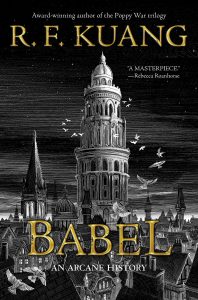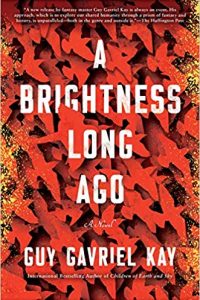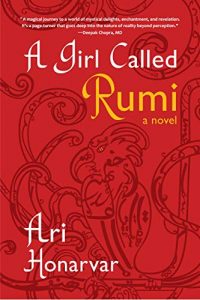Adrienne Martini Reviews Babel: Or the Necessity of Violence: An Arcane History of the Oxford Translators’ Revolution by R.F. Kuang
 Babel: Or the Necessity of Violence: An Arcane History of the Oxford Translators’ Revolution, R.F. Kuang (Harper Voyager 978-0-06302-142-6, $27.99, 560pp, hc) August 2022.
Babel: Or the Necessity of Violence: An Arcane History of the Oxford Translators’ Revolution, R.F. Kuang (Harper Voyager 978-0-06302-142-6, $27.99, 560pp, hc) August 2022.
With Babel: Or the Necessity of Violence: An Arcane History of the Oxford Translators’ Revolution, the multi-award nominated R.F. Kuang travels to 1830s Oxford University to build a tale about a tower built on languages whose fate is all but guaranteed. Her story about colonialism and its collapse revolves around Robin Swift, a soon-to-be Oxford student plucked from his dead mother’s arms in Canton by Oxford’s Professor Lovell and brought to London. Robin’s deliverance wasn’t a random lucky break. Lovell’s connection to the boy is one that becomes increasingly clear as Robin finds his footing in his new city – and his fluency in both Mandarin and English is what seals his entry into Babel, the translator’s college.
Students are funneled into Babel. What comes out is the silver work (read: magic) that the British Empire is built on. Without the translators who create it – the process has to do with the resonance between similar words in different languages – several different kinds of hell will break loose and the Empire will likely fall. Robin and the three other teens in his cohort start out in love with all that the college has to offer. Of course, that can’t last. They realize the whole system is built on the extraction of resources and exploitation of people, and they are pushed into doing something about it.
Kuang takes a big swing with Babel. She folds history lessons into the story, illuminating everything from the Poor Laws to the Luddites and back again. The problem is that this marriage of fiction and non- doesn’t feel to me like a harmonious one, partly because, at least to me, Kuang throws subtlety out of the window about halfway through. Robin’s story is populated by cardboard characters who don’t develop their own energy. The antagonists do everything but twirl their mustaches. To me, the main protagonist bobs along until the plot escalates despite his inaction. Kuang gives him reasons for his choices (or the lack thereof) but they feel unsupported by everything we know about him up to that point. While Kuang’s larger points about colonialism and empire are well supported, the story that surrounds them never really finds its own equally strong footing.
Adrienne Martini has been reading or writing about science fiction for decades and has had two non-fiction, non-genre books published by Simon and Schuster. She lives in Upstate New York with one husband, two kids, and one corgi. She also runs a lot.
This review and more like it in the August 2022 issue of Locus.
 While you are here, please take a moment to support Locus with a one-time or recurring donation. We rely on reader donations to keep the magazine and site going, and would like to keep the site paywall free, but WE NEED YOUR FINANCIAL SUPPORT to continue quality coverage of the science fiction and fantasy field.
While you are here, please take a moment to support Locus with a one-time or recurring donation. We rely on reader donations to keep the magazine and site going, and would like to keep the site paywall free, but WE NEED YOUR FINANCIAL SUPPORT to continue quality coverage of the science fiction and fantasy field.
©Locus Magazine. Copyrighted material may not be republished without permission of LSFF.







